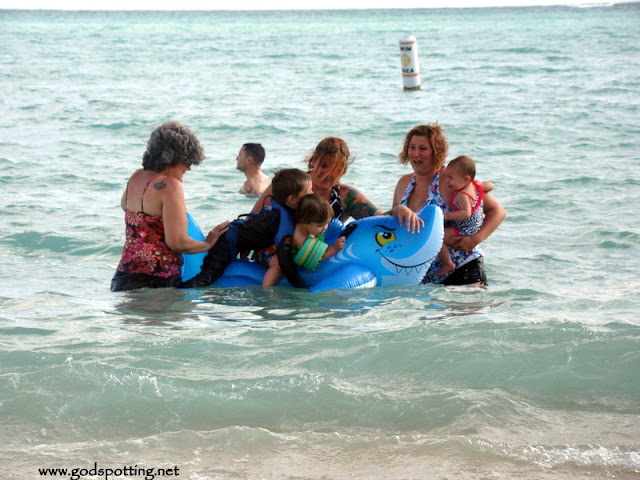>
| Papa and Grandson Make Bug Jar. |
 |
| Family Enjoys Beach. |
| Lala Bakes Cookies for Grandchildren |
 |
| Cousins Goof Off. |
 |
| Young Girls Enjoy Eating Birthday Cake. |
| Man Removes Lights from Christmas Tree. |
No Film at Eleven
First, a disclaimer: I’m not here to bash the media. I know several journalists who pride themselves on their professionalism and commitment to accurately reporting on the events of our lives.
But here’s the thing: News doesn’t happen in the middle of the bell curve. And most of us, most of the time, live in the middle of the bell curve. The news van doesn’t show up when I buy groceries because it’s simply. regular. life.
Think about graduation season. Did you ever see a news feature telling us about a young man of 22, who grew up in the suburbs, graduated from high school, enrolled in the nearby state college, and has completed a degree in accounting? He plans to go to work for Deloitte. His parents gave him a nice briefcase for graduation, and hosted a barbeque in his honor.
No? Me neither. The human interest stories we see in June tell us about the 88-year-old graduate. He’s waaaaaaaaaaaaaaay out at the right-hand tail of the bell curve plotting ages of graduates. He’s news.
I sold Girl Scout cookies as a girl. But I never made the evening news, or even a mention in the local paper. Girls Scouts sell cookies all over, every year. To be newsworthy, the story needs that extreme quality, like the girl who sold twelve gazillion boxes (or something like that) a few years ago.
We all know that our routine lives don’t make news. None of us expects a camera crew to show up because we took out the garbage, or went to church, or repainted the kitchen.
But at the same time, when we’re watching a news story about “others” of some kind or another, we seem to think we’re seeing the middle of their bell curve. So we end up imagining, for example, that every college kid spends spring break on a beach somewhere drinking too much and trashing hotel rooms.
When we “buy the story” about college kids, the results may not be so critical. But when we make those assumptions about people who look different from us, or pray different prayers (or no prayers), or live in a family that’s radically different our own, we make this crazy assumption:
We figure we’re seeing normal, everyday behavior from average representatives of “those guys.”
And maybe we are.
But maybe, we’re not.
I’m going to consciously embrace the maybe we’re not. Who’s with me?
1 Do not judge so that you will not be judged. 2 For in the way you judge, you will be judged; and by your standard of measure, it will be measured to you.
Matthew 7:1-2 (NASB)
I’m linking with Jennifer Dukes Lee (who happens to be a journalist; who happens to possess tremendous integrity) for Tell His Story. Come and see?





Leave a Comment